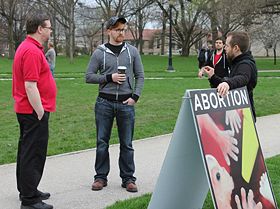Invitational Rhetoric
From DigitalRhetoricCollaborative
Contents |
Introduction
Invitational rhetoric is an alternative form of rhetoric. It seeks to abolish the patriarchal tendencies that go hand-in-hand with traditional rhetoric, such as domination and intimidation. It completely disregards one common goal of traditional rhetoric – to persuade the audience to adopt the rhetor’s beliefs. Instead, it opts for something more discussion-based. As the name suggests, the audience is invited to share their ideas and opinions with the rhetor and other audience members, and can expect to be listened to without hostility or interruption. The utmost objective of invitational rhetoric is to share one’s views so that other participants views may be broadened, and vice versa. It is an educational experience in which no one person is thought to be more valuable.
Artifact Analysis
Artifact 1
Artifact 1 – Anna Russett: Anna is a recently graduated art student from Chicago who has gathered a sizable following on social media, especially Instagram. She often takes selfies, sometimes featuring products, and then proceeds to say something about her day or the products, followed by a question directed at her followers, inviting them to give their input on how their day is going, products that they suggest, or goals that they have. In this particular artifact, Anna features a hair growth product that she is using and then invites her followers to share their hair goals with her, thus sparking an open conversation about different goals and products. [1]
The main idea of Anna Russett’s work is to engage with her fan base. Making a living off of YouTube and Instagram, she needs to uphold a rich relationship with herself and her fans or she cannot thrive. Anna, who goes by the username @annarussett on Instagram and her own name on YouTube, often asks her flowers questions they are meant to respond to. The situation is very open, simple questions like “How was your day?” or “What do you plan on doing this holiday?” and so on allows readers from around the world to begin conversations directly with her even though she is located in Chicago, Illinois. In one of her recent posts she engaged the audience over hair styling tips. “Gonna grow out my hair with help from @avivahair #avivahair !!! anyone have any hair goals for 2015?” She utilizes Invitational Rhetoric by asking her audience simple questions and allowing everyone the opportunity to respond. All one needs to do to respond is have either a YouTube or Instagram account which one can sign up for in a few easy clicks of the mouse. She states that she responds to as many of her followers as she can, and they appreciate it. By beginning an open discussion, she facilitates the dissension of new ideas and unique ways of thinking among her thousands of followers.
Artifact 2
Artifact 2 – Oval Preachers: The Oval Preachers are religious people (often male) who regularly set up camp on the Ohio State Oval and aggressively preach about controversial issues including social things like abortion, homosexuality, etc. They often have large picket signs and resort to yelling across the Oval and attempting to stop students on their way to class with forced conversations revolving around religion in relation to these controversial issues.[2]
Reading the description alone, it is clear that the oval preachers do not practice invitational rhetoric. An example of these oval preachers, and the group that will be examined, is the Columbus based anti-abortion group, Created Equal. This group uses an excess of graphic images of late term abortions in order to shock students, including a large screen showing violent images and videos of women going through abortions. They believe that these images will cause the students to rethink their stance on abortion. They are not open to hearing the opinions and reasons of the opposite side, and their one and only goal is to persuade students to be pro-life. Because of this, their rhetoric is an extreme version of the patriarchal tendencies of traditional rhetoric. They are using intimidation in order to persuade their audiences. They also believe that their opinions are superior and more valuable, while giving little attention to the audience. This is the type of traditional rhetoric that invitational rhetoric is trying to abolish.
Additional Resources
Foss, Sonja. "Invitational Rhetoric." Encyclopedia of Communication Theory. Web. 16 Apr. 2015. <http://www.sonjafoss.com/html/Foss63.pdf>.
References
- ↑ Russett, Anna. Anna Russett Hair Product. Digital image. Instagram.com. 2 Jan. 2015. Web.
- ↑ Conley, Justin, and Thomas Bradley. "Oval Preacher Takes Message to ‘turf’." The Lantern 30 Nov. 2010. The Ohio State University. Web. 16 Apr. 2015. <http://thelantern.com/2010/11/oval-preacher-takes-message-to-turf/>.


